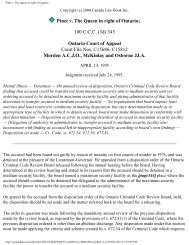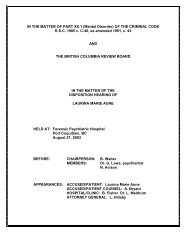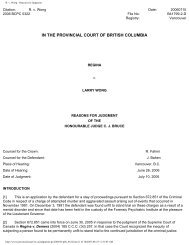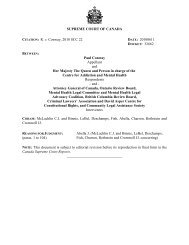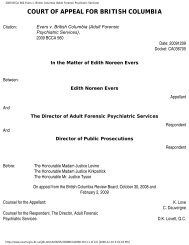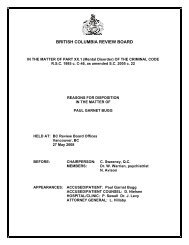R. v. Cuerrier - British Columbia Review Board
R. v. Cuerrier - British Columbia Review Board
R. v. Cuerrier - British Columbia Review Board
Create successful ePaper yourself
Turn your PDF publications into a flip-book with our unique Google optimized e-Paper software.
R. v. <strong>Cuerrier</strong><br />
settled: fraud does not vitiate consent to assault unless the mistake goes to the nature of the act or the<br />
identity of the partner. Fraud as to collateral aspects of a consensual encounter, like the possibility of<br />
contracting serious venereal disease, does not vitiate consent. In amending the Criminal Code in 1983<br />
and adopting a new definition of fraud for assault, including sexual assault, Parliament did not intend to<br />
remove the common law limitations. An intent to broaden the crime of assault radically cannot be<br />
inferred from Parliament's removal of the words "nature and quality of the act". Rather, Parliament<br />
must be supposed to have expected that the courts would continue to read the Code provisions on sexual<br />
assault against the background of the common law, unless it used language clearly indicating that it was<br />
altering the common law. There is nothing in s. 265 to indicate such an intention. This conclusion is<br />
supported by s. 45(2) of the Interpretation Act, which provides that an amending enactment shall not be<br />
deemed to involve a declaration of a change in the existing law. It is also supported by the rule of<br />
construction that where, as here, a criminal statute is ambiguous, the interpretation that favours the<br />
accused is preferred. As well, the jurisprudence, without exception, supports the view that Parliament<br />
intended to retain the common law definition of fraud for assault. Section 265(3) must, therefore,<br />
continue to be read in light of the common law.<br />
It is an established rule that courts will effect changes to the common law only where those changes<br />
are incremental developments of existing principle and where the consequences of the change are<br />
contained and predictable. Here, the broad changes proposed to the common law concept of fraud for<br />
assault do not fall within this test. Both the application of the commercial concept of fraud, limited by<br />
an ad hoc qualifier that there must be a "significant risk of serious bodily harm", and the application of<br />
an unqualified view of fraud which includes any deceit inducing consent to contact amount to<br />
abandoning the common law rule and substituting new principles in its place. Not only are the proposed<br />
extensions of the law sweeping, they are unprecedented. Moreover, the theoretical difficulties with both<br />
proposals are matched by the practical problems they would introduce. Parliament is better equipped<br />
than the courts to foresee the complex ramifications of such sweeping change and make the necessary<br />
value choices.<br />
It is open, however, for courts to make incremental changes by extending the common law concepts<br />
of nature of the act and identity, provided the ramifications of the changes are not overly complex. It is<br />
the proper role of the courts to update the common law from time to time to bring it into harmony with<br />
the changing needs of society. This applies to the common law concept of fraud in relation to assault. In<br />
this case, the current state of the law does not reflect the values of Canadian society. It is unrealistic to<br />
think that consent given to sex on the basis that one's partner is HIV-free stands unaffected by blatant<br />
deception on that matter. Where a person represents that he or she is disease-free, and consent is given<br />
on that basis, deception on that matter goes to the very nature of the sexual act. To say that such a person<br />
commits fraud vitiating consent, thereby rendering the contact an assault, seems right and logical. A<br />
return to the pre-Clarence view of the common law that deception as to venereal disease may vitiate<br />
consent would catch the conduct here at issue, without permitting people to be convicted of assault for<br />
other inducements, and would draw a clear line between criminal and non-criminal conduct. This<br />
proposed extension of the law is relatively narrow, catching only deceit as to venereal disease where it is<br />
established, beyond a reasonable doubt, that there was a high risk of infection and that the defendant<br />
knew or ought to have known that the fraud actually induced consent to unprotected sex. This limited<br />
http://ql.quicklaw.com/qltemp/C2KEwCMAFbZMTYcs/00011scr-00019415%2ehtm (4 of 44)2007-08-21 1:18:15 PM



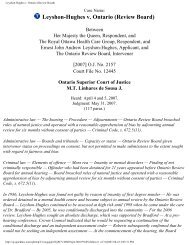
![LaFortune [LaFortunate] (Re) - British Columbia Review Board](https://img.yumpu.com/42779845/1/190x245/lafortune-lafortunate-re-british-columbia-review-board.jpg?quality=85)
